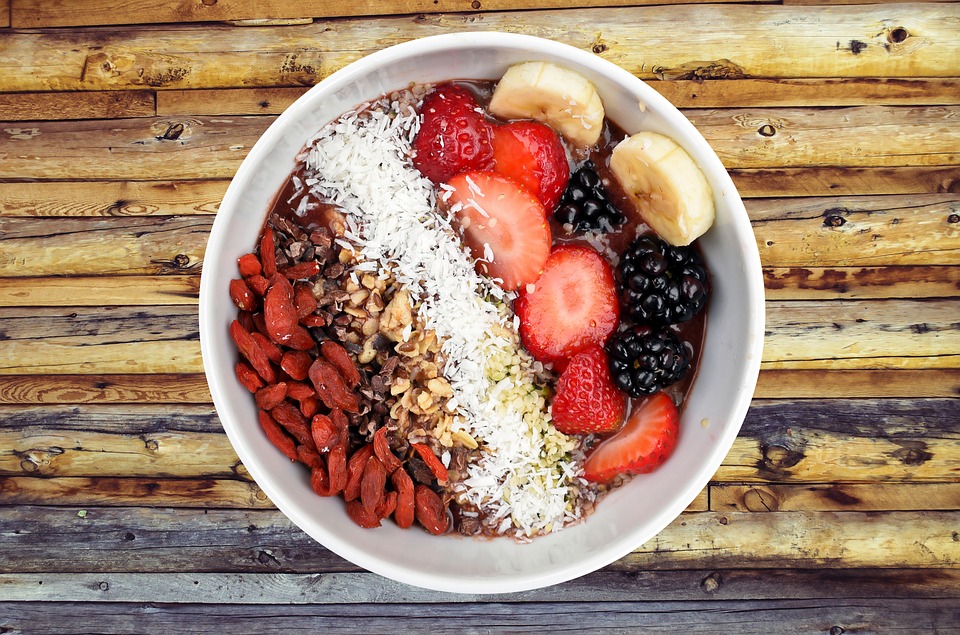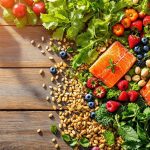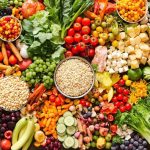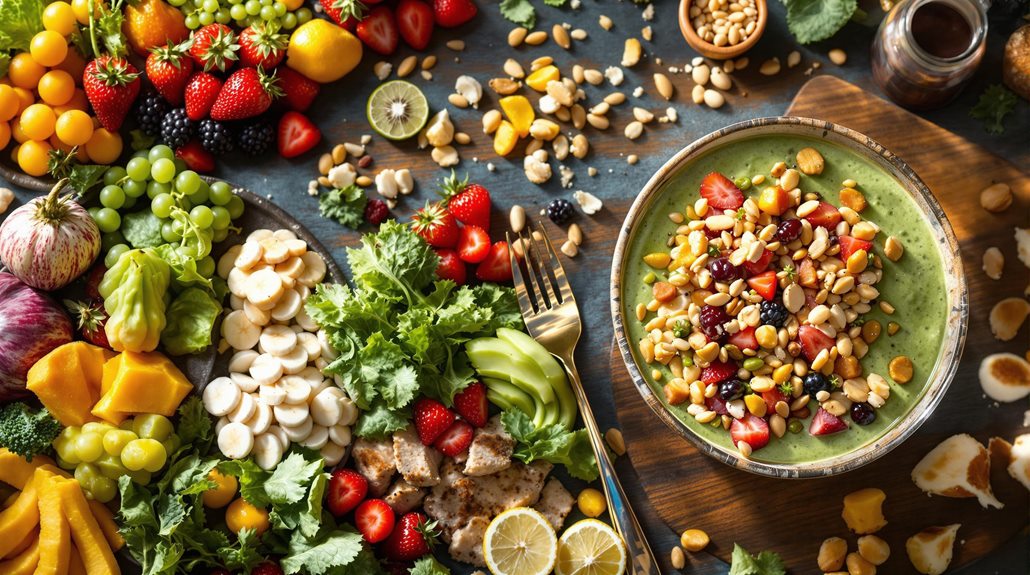
To fuel your active lifestyle effectively, focus on balanced nutrition with the right mix of carbohydrates, proteins, and healthy fats. Carbs should make up 45-65% of your diet for sustained energy, while proteins, about 1.6 to 2.2 grams per kilogram of body weight, aid muscle recovery. Healthy fats, constituting 20-35% of your intake, reduce inflammation and support overall health. Remember, hydration is key, so drink plenty of water to boost nutrient transport. Smart snacking and strategic meal planning will help you make healthier choices and maintain your energy. Curious about optimizing every aspect of your nutrition for performance?
Foundation of Proper Nutrition
When it comes to achieving an active lifestyle, the foundation of proper nutrition simply can’t be overlooked. It’s not just about what you eat, but how it fuels your body. A balanced diet is your secret weapon, consisting of 45-65% carbohydrates, which are essential nutrients needed to keep your energy levels up and running smoothly. Incorporating sufficient protein is crucial as well, as it helps increase muscle mass and maintain a positive nitrogen balance during exercise. You’ll find that healthy eating directly impacts your performance and recovery.
Hydration plays a critical role too. Don’t wait until you’re exercising to start sipping; consistent water intake throughout the day is essential. Staying hydrated ensures that your body can efficiently transport these nutrients and maintain optimal functions. So, make water your constant companion.
Embracing healthy eating habits means planning your meals carefully to avoid those unhealthy food choices that sneak up on you. Meal planning isn’t just about convenience; it’s about making conscious decisions that support your active lifestyle. By prioritizing a nutritious blend of carbohydrates, proteins, and fats, you’re laying down the foundation for long-lasting vitality and enhanced performance. You’re not just eating for today; you’re building a platform for your future health and energy. Let’s make every bite count!
Importance of Macronutrient Balance
You’ve probably heard the phrase “balance is key” a thousand times, but it’s especially true when it comes to macronutrients. It’s crucial to get the right mix of carbohydrates, protein, and healthy fats to maintain overall health and fuel an active lifestyle. A well-balanced diet ensures you’re not just surviving, but thriving. Moreover, incorporating high-protein snacks into your diet can help extend the time between meals and reduce overall food intake, contributing to effective weight management.
Let’s break it down:
- Carbohydrates: Aim for 45-65% of your diet. They’re not the enemy—complex carbs from whole grains, fruits, and vegetables provide the sustained energy your body craves.
- Protein: Essential for muscle repair, a daily intake of about 1.6 to 2.2 grams per kilogram of body weight is perfect for those on the move. Think lean meats, fish, and plant-based proteins.
- Healthy Fats: Don’t shy away. Healthy fats, which make up 20-35% of your diet, are vital for reducing inflammation and supporting energy levels. Unsaturated fats from nuts, seeds, and avocados are your best friends.
Avoid hopping on every new diet fad that promises quick results. A consistent macronutrient balance is your ticket to effective long-term weight management and well-being. Trust balance—it’s the real game-changer.
Role of Carbohydrates
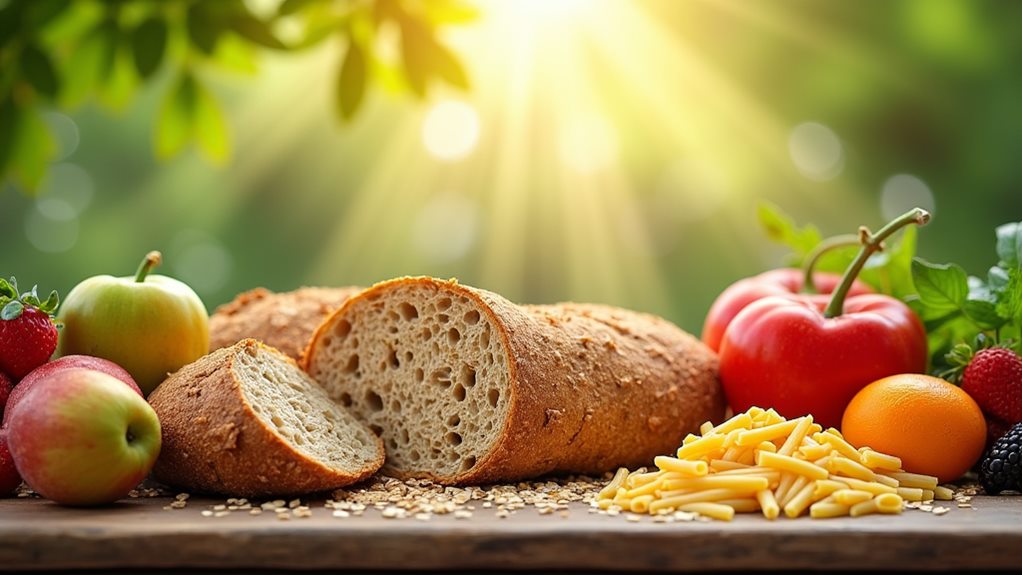
Fueling your body with carbohydrates is essential for keeping your energy levels up and your brain functioning at its best. Whether you’re an athlete or enjoying an active lifestyle, carbs should be your go-to energy source. They should make up 45-65% of your daily calories. This isn’t just about any carbs, though — focus on complex carbohydrates. Found in whole grains, fruits, and vegetables, these carbs digest slowly. They help keep your blood sugar stable and provide long-lasting energy, ensuring you stay energized during your day. Additionally, carbohydrates play a key biochemical role by converting glucose to ribose and deoxyribose, which are crucial for the synthesis of RNA, DNA, and ATP.
Imagine powering through workouts with the energy these carbohydrates provide. Eating complex carbohydrates before exercising can boost your performance and increase your glycogen stores, which serve as fuel for your muscles. And after a workout, consuming carbs helps replenish these glycogen levels, aiding recovery and getting you ready for your next session. Remember, active individuals, especially those participating in endurance sports, might need more carbohydrates to meet the additional energy demands of intense training. Lastly, don’t forget that dietary fiber, found in many carbohydrate-rich foods, plays a vital role in keeping your digestive system running smoothly. So, load up on carbs — all systems go!
Protein for Muscle Recovery
Protein is your body’s essential ally for muscle recovery and growth. If you’re physically active, you should aim to consume 1.6 to 2.2 grams of protein per kilogram of body weight daily. This isn’t just about quantity; timing matters too. For optimal muscle protein synthesis, it’s best to take in protein within 30-60 minutes post-exercise. This helps muscles repair and grow.
Incorporating lean proteins such as chicken, fish, legumes, and nuts into your meals is a smart move. They provide crucial nutrients without excess fat. And don’t forget—pairing carbohydrates and protein helps replenish glycogen stores, boosting overall recovery.
Here’s how you can make protein work for you:
- Variety is vital: Diversify protein sources, mixing both animal and plant-based proteins for a complete amino acid profile. It maximizes your muscle recovery potential.
- Think satiation: Protein isn’t just about recovery. Its satiating properties support effective weight management. You’re less tempted to overeat with protein-rich nutritious foods.
- Nutritious combo: Combining carbohydrates and protein post-workout not only aids in recovery but also contributes to a balanced, sustainable diet tailored for your active lifestyle.
Healthy Fats Insight
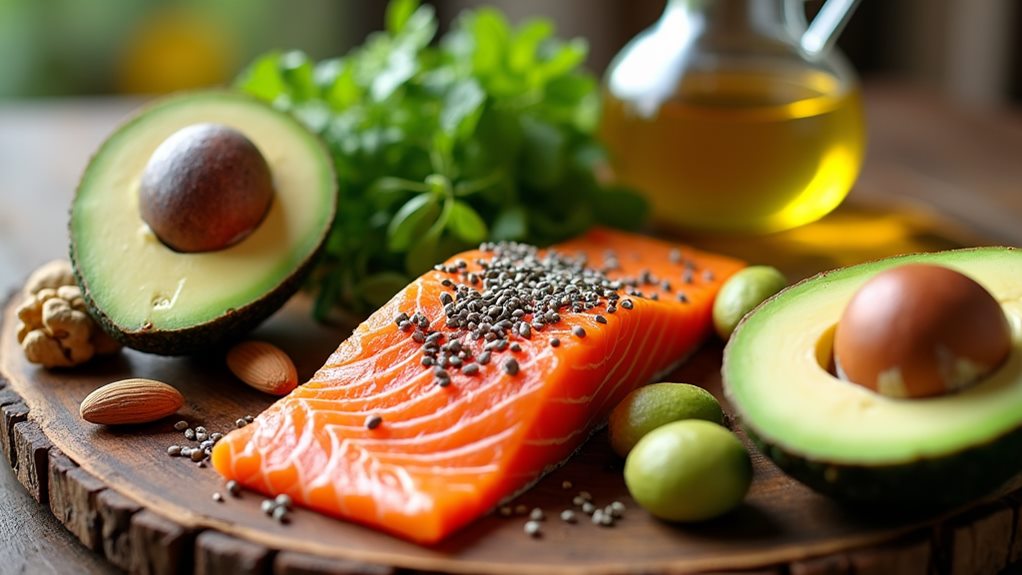
As you build a strong foundation for your active lifestyle, it’s important not to overlook the role of healthy fats. These unsung heroes, particularly unsaturated fats, hold the key to heart health and can significantly reduce inflammation. You’ll find them in foods like avocados, nuts, seeds, olives, and oils such as olive and canola. They’re not just tasteful additions but essential components that enhance your meals, allowing your body to absorb fat-soluble vitamins like A, D, E, and K more effectively.
To maintain optimal health and energy, aim for healthy fats to constitute about 20-35% of your daily caloric intake. Including the powerful omega-3 fatty acids into your diet is a game-changer. Found in fatty fish, flaxseeds, and walnuts, omega-3s are crucial not only for brain health but also in reducing the risk of chronic diseases and aiding in exercise recovery. So, integrating these healthy fats into your diet isn’t just smart—it’s vital for sustaining an active and robust lifestyle. Don’t miss out on this essential nutrient; make them a staple in your daily meals for optimal performance and long-term wellness.
Pre-Workout Nutrition Tips
Before you hit the gym or the trail, what you eat can make all the difference in your performance and energy levels. The right pre-workout snacks are your ticket to maximizing every ounce of effort you put into exercise. Your best bet is a combination of carbohydrates and protein, ideally consumed 1-3 hours before working out. Here’s how to fuel up effectively:
- Hydration: Drink water two hours prior to your workout to ensure optimal performance and prevent dehydration. It’s not just about quenching thirst; proper hydration supports energy and endurance.
- Choose Wisely: Opt for easily digestible foods like whole grains and fruits and vegetables. A small bowl of whole-grain cereal or some low-fat yogurt can provide sustained energy without discomfort.
- Snacks on the Go: If you’re pressed for time, grab a quick banana or apple 5-10 minutes before you start. They’ll offer that immediate energy boost you need to get moving.
Avoid heavy meals high in saturated fats and proteins right before exercising. These can hinder digestion and reduce muscle oxygen availability, leaving you sluggish. Remember, the right pre-workout nutrition sets the stage for success.
Post-Workout Refueling
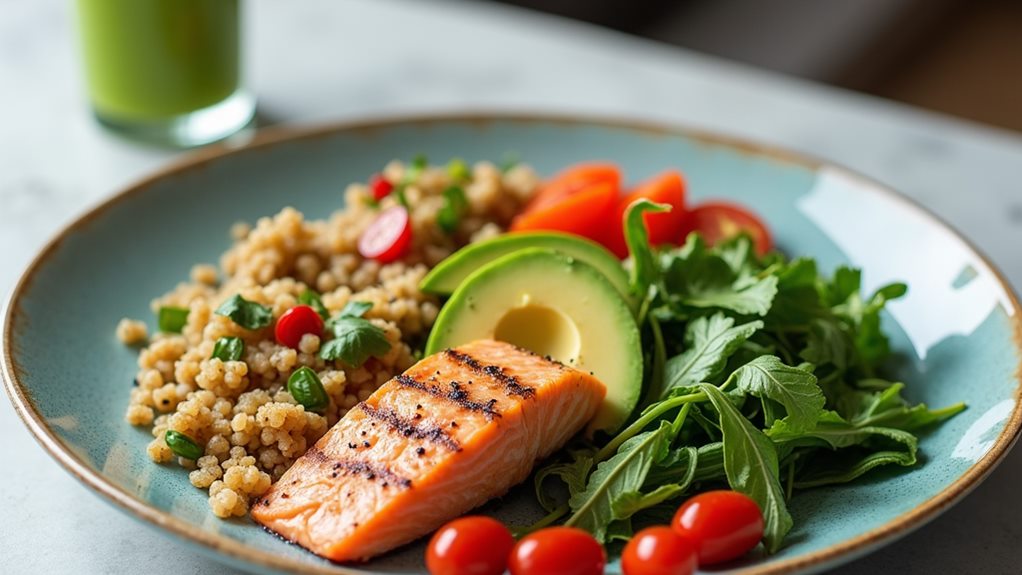
After a workout, your body’s like a sponge, ready to soak up the nutrients it needs to recover and grow stronger. Timing is everything in post-workout recovery. Aim to refuel within 30-60 minutes to replenish glycogen stores and kickstart muscle repair. Don’t skip out on carbohydrates and protein; they’re your best friends right now. A 3:1 ratio of carbs to protein works wonders—think skinless chicken, fish, beans, and fruits. These foods optimize recovery by providing the right energy and nutrients.
But don’t just stop there. Make sure to rehydrate effectively. While water is essential, consider adding electrolyte-rich foods like leafy greens and low-fat dairy to your regime. It keeps your body’s hydration levels balanced for optimal recovery. And, let’s not forget about healthy fats. Avocados and nuts do more than taste good—they support energy availability and help your body recover more efficiently.
Lastly, keep track of what you eat post-workout. It can drastically improve recovery times and your performance in future workouts. Prioritize your post-workout nutrition, and you’ll notice the difference in your energy levels and ability to tackle that next workout with gusto.
Importance of Hydration
You’ve nailed your post-workout refueling, but don’t overlook hydration’s role in your recovery routine. Consistent water intake is your secret weapon for optimizing physical performance, cognitive function, and muscle recovery. Dehydration can zap energy levels, making it vital to stay ahead of the game. Here’s how to keep your hydration in check effectively:
- Pre-Exercise Hydration: Drink water two hours before your workout. This primes you for peak performance and ensures that dehydration won’t hamper your session’s success.
- During Workout: For exercises lasting less than an hour, sip water frequently to maintain hydration. For longer workouts, include 30-90 grams of carbohydrates per hour to sustain energy levels. These steps keep you sharp and focused throughout your activity.
- Post-Exercise Rehydration: After your workout, rehydrate and replace lost electrolytes. Water is key, but you also need foods rich in electrolytes like fruits, leafy greens, and low-fat dairy to fully recover and enhance endurance.
Prioritizing hydration propels your active lifestyle forward. It grounds your physical activity with a solid foundation, ensuring you stay energetic, focused, and ready for whatever challenge comes next. Don’t underestimate the power of water!
Smart Snack Suggestions
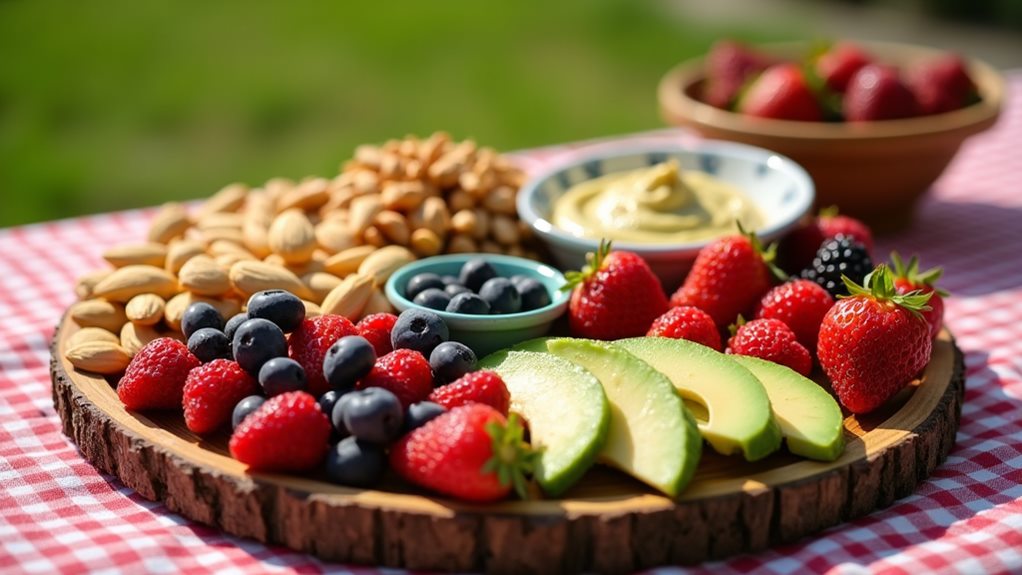
When you’re living an active lifestyle, smart snacking becomes your ally for keeping energy levels steady and preventing unnecessary indulgence later. Having a stash of healthy snacks on hand ensures you’re fueling your body with the nutrients it craves. Think of snacks like apple slices with peanut butter or low-fat granola with raisins. These combine carbohydrates and protein, giving you that burst of energy and long-lasting fullness.
Incorporating fruits and vegetables into your snack routine can boost your nutrient intake while keeping your diet balanced. Imagine the convenience and nutrition of a fruit and nut trail mix — it’s a tasty option that’s easy to grab on the go. Portion control is essential here. Always aim for sizes that fit your dietary goals, so you’re not unintentionally loading up too many calories.
Healthy snacks, such as Greek yogurt topped with berries or a handful of carrot sticks with hummus, stabilize your blood sugar levels. They can also help curb the tendency to overeat at meal times. Opting for snacks low in added sugars and unhealthy fats supports better energy management and aligns with your active lifestyle aspirations. So go on, snack smart and thrive!
Meal Planning Strategies
Meal planning isn’t just a trend; it’s a foolproof strategy to take control of your nutrition and keep your active lifestyle on track. By meal prepping, you’ll ensure balanced meals throughout the week, avoiding those unhealthy, last-minute food decisions that can derail your goals. Start by incorporating a wide variety of food sources into your plan. Combine fruits, vegetables, whole grains, lean proteins, and low-fat dairy to boost nutrient intake and health.
To make the most of your meal planning:
- Track Food Intake: Use a journal or app to focus on what’s working and what needs adjustment. It’s crucial to identify patterns and understand your eating habits better.
- Focus on Balance: Plan your meals around a balanced composition—aim for 50-60% carbohydrates, 10-35% protein, and 20-35% fat. This ensures you’re optimizing energy levels for your active life.
- Experiment with Recipes: Don’t shy away from trying new cooking methods. It keeps meals exciting and supports a diverse nutrient intake.
Enhancing Fruit and Veggie Intake

While meal planning forms the backbone of a solid nutritional strategy, boosting your intake of fruits and vegetables takes your diet to the next level. Not only do these colorful powerhouses provide essential nutrients and antioxidants, but they also aid in maintaining a healthy weight and complement regular exercise. Aim to fill half your plate with a variety of fresh produce at each meal. This simple change helps crowd out processed foods and encourages healthier eating habits naturally.
Experimenting with cooking methods like steaming or roasting can enhance the flavor of your veggies while preserving their nutritional value. Consider setting personal goals, such as consuming at least 5 servings of fruits and vegetables daily. This commitment improves overall health and reduces the risk of chronic diseases. For easy snacks, try apple slices paired with nut butter or mixed berries. By incorporating these options, you’ll find it easier to increase your intake throughout the day.
Looking for a delicious way to enjoy more produce? Create mixed dishes like salads or stir-fries that combine a variety of fruits and vegetables. Pair them with whole grains to ensure a balanced meal that’s both satisfying and nutrient-dense.
Power Your Workouts With Nutrition
Achieving optimal nutrition for an active lifestyle is crucial for enhancing performance, boosting recovery, and maintaining overall health. By understanding the importance of pre-workout and post-workout nutrition, individuals can ensure their bodies have the necessary fuel and nutrients to maximize exercise benefits. Consuming a well-balanced intake of macronutrients—comprising 45-65% carbohydrates, 10-35% protein, and 20-35% fats—ensures sustained energy, supports muscle function, and aids in recovery. Pre-workout meals rich in complex carbohydrates from sources like whole grains and fruits help build glycogen stores, while post-workout meals focus on high-protein and high-carb content to repair muscles and reduce soreness.
Throughout the day, prioritizing complex carbohydrates like those from whole grains, vegetables, and fruits is essential for providing sustained energy needed for both exercise and daily activities. Hydration plays an equally vital role in optimizing performance and recovery. Drinking adequate water before, during, and after workouts helps maintain fluid balance and prevents performance decline, particularly in prolonged or intense activities. By aligning nutritional choices with exercise regimens, individuals can effectively power their workouts and recover effectively. Embracing balanced nutrient intake not only leads to improved physical outcomes but also fosters a healthier, more energized lifestyle overall, enabling individuals to pursue their fitness goals with vigor and resilience.


